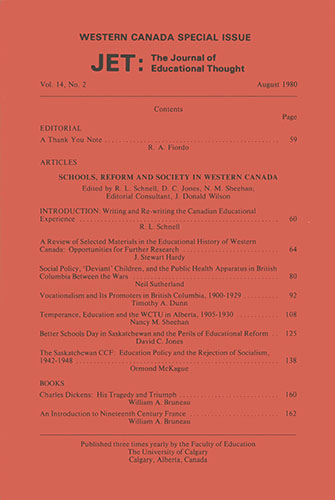Vocationalism and Its Promoters in British Columbia, 1900-1929
DOI :
https://doi.org/10.55016/ojs/jet.v14i2.43871Résumé
Despite the steady erosion of public confidence in schools during recent years, faith in education's efficacy remains strong. Schools are still commonly believed to be potent institutions for fostering democracy, justice, economic development, and upward social mobility. In Canada politicians and educators advocate that "career education" and going "back to basics" will help solve the problems of a slumping economy and apparently weakened social fabric. 1 Although some regard contemporary concern for restructuring schools as unprecedented, both in its dimension and vigor, this is largely due to the fact that most take schools for granted, and thus require "little or no explanation of their origin, or justification for their continuing existence." 2 The drive for social change through public education, however, has existed since the mid-nineteenth century in Canada. In British Columbia, for instance, the educational system was dramatically overhauled between 1900 and 1929, often in accordance with social reformers' suggestions. The administration grew and became more expert, teachers were better trained, the curriculum was differentiated, and vocational instruction, guidance, testing, and junior high schools were implemented. 3 This paper examines one strand of that school reform as education's societal relationships changed and adapted with the transition to a maturing urban industrial province.
Téléchargements
Téléchargements
Publié-e
Numéro
Rubrique
Licence
The Journal of Educational Thought retains first publication rights for all articles. The Journal grants reproduction rights for noncommercial educational purposes with the provision that full acknowledgement of the work’s source be noted on each copy. The Journal will redirect to the appropriate authors any inquiries for further commercial publication of individual articles. All authors wishing to publish in JET will be asked to fill in and sign a Consent to Publish and Transfer of Copyright agreement.
Authors must affirm that any submission to JET has not been and will not be published or submitted elsewhere while under considration by JET.

